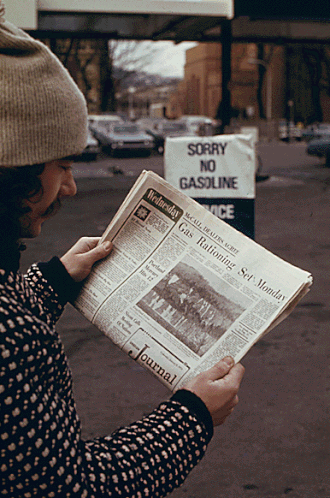1973 oil crisis



1973 Oil Crisis
The 1973 Oil Crisis was a pivotal moment in the 20th century that had far-reaching economic and political consequences across the globe. It began in October 1973, when the members of the Organization of Arab Petroleum Exporting Countries (OAPEC), led by Saudi Arabia, decided to impose an oil embargo against countries perceived as supporting Israel during the Yom Kippur War. The embargo targeted primarily the United States, Canada, Japan, the United Kingdom, and the Netherlands. This action caused a significant disruption in the global supply of oil, leading to severe shortages and skyrocketing prices worldwide.
Background[edit]
The roots of the crisis can be traced back to the complex geopolitical landscape of the Middle East, particularly the ongoing conflict between Israel and its Arab neighbors. The Yom Kippur War of October 1973 was a conflict between Israel and a coalition of Arab states led by Egypt and Syria. In response to the initial successes of the Arab coalition, the United States and other Western nations provided support to Israel, prompting OAPEC's retaliatory embargo.
Impact[edit]
The immediate effects of the oil crisis were profound. Oil prices quadrupled, from $3 per barrel to nearly $12 by March 1974, causing widespread economic disruption in countries heavily dependent on imported oil. The crisis led to severe fuel shortages, long lines at gas stations, and the introduction of rationing programs in several countries. It also prompted a shift in the global economic balance, with oil-producing countries in the Middle East gaining significant financial and political leverage.
The long-term impacts were equally significant. The crisis exposed the vulnerability of the global economy to oil supply shocks and led to a reevaluation of energy policies in many countries. It accelerated the search for alternative energy sources, such as nuclear power and renewable energy, and prompted measures to improve energy efficiency. The crisis also led to the establishment of the International Energy Agency (IEA) in 1974, aimed at coordinating a collective response to future oil supply disruptions.
Response[edit]
In response to the crisis, Western countries took several measures to reduce their dependence on Middle Eastern oil. These included investing in alternative energy sources, increasing energy efficiency, and building strategic petroleum reserves. The crisis also prompted changes in consumer behavior, with a shift towards smaller, more fuel-efficient vehicles.
Aftermath[edit]
The 1973 Oil Crisis had a lasting impact on international relations and the global economy. It marked the beginning of a new era of increased complexity and interdependence in the global energy market. The crisis also highlighted the need for comprehensive energy policies that address both the supply and demand sides of the equation.
In the years following the crisis, the world experienced several more oil supply disruptions, most notably the 1979 energy crisis following the Iranian Revolution. These events reinforced the lessons of the 1973 crisis and the importance of diversifying energy sources and improving energy efficiency.
Ad. Transform your life with W8MD's Budget GLP-1 injections from $75


W8MD offers a medical weight loss program to lose weight in Philadelphia. Our physician-supervised medical weight loss provides:
- Weight loss injections in NYC (generic and brand names):
- Zepbound / Mounjaro, Wegovy / Ozempic, Saxenda
- Most insurances accepted or discounted self-pay rates. We will obtain insurance prior authorizations if needed.
- Generic GLP1 weight loss injections from $75 for the starting dose.
- Also offer prescription weight loss medications including Phentermine, Qsymia, Diethylpropion, Contrave etc.
NYC weight loss doctor appointmentsNYC weight loss doctor appointments
Start your NYC weight loss journey today at our NYC medical weight loss and Philadelphia medical weight loss clinics.
- Call 718-946-5500 to lose weight in NYC or for medical weight loss in Philadelphia 215-676-2334.
- Tags:NYC medical weight loss, Philadelphia lose weight Zepbound NYC, Budget GLP1 weight loss injections, Wegovy Philadelphia, Wegovy NYC, Philadelphia medical weight loss, Brookly weight loss and Wegovy NYC
|
WikiMD's Wellness Encyclopedia |
| Let Food Be Thy Medicine Medicine Thy Food - Hippocrates |
Medical Disclaimer: WikiMD is not a substitute for professional medical advice. The information on WikiMD is provided as an information resource only, may be incorrect, outdated or misleading, and is not to be used or relied on for any diagnostic or treatment purposes. Please consult your health care provider before making any healthcare decisions or for guidance about a specific medical condition. WikiMD expressly disclaims responsibility, and shall have no liability, for any damages, loss, injury, or liability whatsoever suffered as a result of your reliance on the information contained in this site. By visiting this site you agree to the foregoing terms and conditions, which may from time to time be changed or supplemented by WikiMD. If you do not agree to the foregoing terms and conditions, you should not enter or use this site. See full disclaimer.
Credits:Most images are courtesy of Wikimedia commons, and templates, categories Wikipedia, licensed under CC BY SA or similar.
Translate this page: - East Asian
中文,
日本,
한국어,
South Asian
हिन्दी,
தமிழ்,
తెలుగు,
Urdu,
ಕನ್ನಡ,
Southeast Asian
Indonesian,
Vietnamese,
Thai,
မြန်မာဘာသာ,
বাংলা
European
español,
Deutsch,
français,
Greek,
português do Brasil,
polski,
română,
русский,
Nederlands,
norsk,
svenska,
suomi,
Italian
Middle Eastern & African
عربى,
Turkish,
Persian,
Hebrew,
Afrikaans,
isiZulu,
Kiswahili,
Other
Bulgarian,
Hungarian,
Czech,
Swedish,
മലയാളം,
मराठी,
ਪੰਜਾਬੀ,
ગુજરાતી,
Portuguese,
Ukrainian